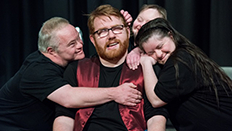History and Public Policy
It is often said that one of the reasons we should study history is to make sense of the present.
If that is the case then, asks Vanessa Collingridge, why aren’t more historians routinely involved in shaping public policy? How and why should historians have a voice in contemporary decision making, from flood prevention, welfare, to immigration?
Alix Green
Lecturer in Public History, University of Central Lancashire
 Public policy matters - it affects people's lives, from the everyday business of potholes and policing to the decisions about climate change and conflict made on the world stage.
Public policy matters - it affects people's lives, from the everyday business of potholes and policing to the decisions about climate change and conflict made on the world stage.
The notion we can make better policy decisions through learning the 'lessons' of history is an appealing one and invoking the past can be a powerful way for politicians to justify a course of action or criticise an opponent's position. Historians tend to see things differently, arguing that getting the 'long view' of a policy issue is vital. After all, where else has the present to come from but the past? However new or unique a problem may seem, there is always a history to explore.
We’ve already seen historians taking to blogosphere on the hot topic of Britain’s place in Europe, and taking very different positions on what the lessons from history may be. Differences of opinion shouldn’t be seen as a problem - on the contrary, they’re vital for a healthy, vibrant deliberative democracy.
The historian can also access what Sarah Lloyd has called the 'archives of the otherwise', uncovering the plans, ideas and strategies that were once imagined but not, or not fully, realised. Historians cannot predict the future, but their understanding of the past gives policymakers at least some contours and features to help them navigate.
That, at least, is the pitch for using history in public policy. In reality, integrating historical perspective into political decision-making has proved challenging to say the least. Incompatible timescales have often been cited. The policymakers wants clear-cut recommendations in a week, the historian plans research over months, if not years.
Academics are often concerned about how their expertise will be used, as Ciara Meehan explains. Will it serve partisan ends rather than public good? Will my careful caveats be dropped in pursuit of a predetermined agenda?
Both academics and policymakers have legitimate concerns about engaging with the other. But they don't tend to have the kind of relationship that enable those concerns to be brought to the surface and addressed. Perhaps it is a case of unfamiliarity breeding contempt.
How history is organised as an academic discipline doesn't always help historians connect to policymakers and other interested parties. We tend to see ourselves as specialists in a period or geographical area, or as practitioners of a particular approach, such as social or economic history.
This can stop us recognising the relevance of what we do, particularly for historians of the medieval or early-modern periods, or those working on other countries. But rather than thinking just about how we pursue our own specialist interests, we can ask, as Steve Poole does, ‘how can we use our academic expertise in the world?’
The shift to thinking in terms of issues or problems - care of the elderly, the provision of welfare, immigration - is a difficult one when academic training and esteem is focused on the accumulation of deep knowledge of a specialist field, underpinned by extensive archival work.
There are, however, issues and groups that have been largely ignored by historians - which can be a problem when it comes to policy. Historians have made important contributions to social movements pressing for recognition, equality and rights, for example, to campaigns for LGBTQ, women’s, and Black liberation. But, as Di Christian points out, they’ve given little attention to other groups struggling to be heard in society, such as people with learning disabilities. Claiming a past can be an important step towards imagining - and lobbying for - a better future.
Being a thinking, reflective intellectual, in Anna Whitelock’s words, means sometimes stepping outside specialist comfort zones and applying the historical mind to the problems that matter in public debate.
Policy problems are complex and cut across the boundaries of academic fields. If we think about tackling climate change adapting to meet the needs of an aging society, it’s clear that no one academic discipline can have all the answers. Even in policy areas with a major scientific or technical dimension, such as energy or healthcare, there are always questions of human behaviour, ethics, culture and values to consider. That’s where the humanities come in.
As Lucy Robinson argues, it’s politically important at this moment to defend the value of the humanities in their own right. At the same time, however, we can’t afford to get stuck in defensive mode. Making common cause with academics from other fields to address a particular policy problem may serve us better than advocating that ‘history matters’.
History has much to offer, but to be useful, historians will have to learn to link up with experts from other fields in creative and collaborative ways - just as Steve Poole did with the Somerset flood resilience programme.
But can historians go even further? Working with local groups, charities and social movements is important work, but it is not always possible to achieve all the influence over policy that’s needed as an outsider. Can the historian operate as an insider in government, alongside civil servants, ministers and policy advisers - as well as other specialists, such as economists? If we’re willing to co-produce projects with communities, can we imagine collaborating with policymakers? That may be the next leap public history needs to take.
